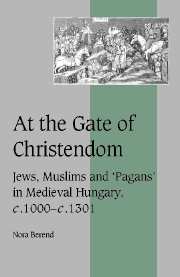Book contents
- Frontmatter
- Contents
- List of maps
- Acknowledgements
- List of abbreviations
- INTRODUCTION
- 1 HUNGARY: A FRONTIER SOCIETY
- 2 CHRISTIANS AND NON-CHRISTIANS
- 3 THE LEGAL POSITION OF HUNGARY'S NON-CHRISTIAN POPULATION
- 4 NON-CHRISTIANS IN HUNGARIAN ECONOMY AND SOCIETY
- 5 CONFLICTS BETWEEN THE PAPACY AND THE KINGS
- 6 CHRISTIAN PERCEPTIONS AND ATTITUDES
- 7 NON-CHRISTIAN COMMUNITIES: CONTINUITY, TRANSFORMATION, CONVERSION AND ASSIMILATION
- CONCLUSION
- Appendix 1 Hungarian kings of the house of Árpád
- Appendix 2 Toponyms, with Latin and German equivalents
- Appendix 3 The manuscript tradition of the Synod of Buda (1279)
- Bibliography
- Index
- Cambridge Studies in Medieval Life and Thought Fourth series
4 - NON-CHRISTIANS IN HUNGARIAN ECONOMY AND SOCIETY
Published online by Cambridge University Press: 06 January 2010
- Frontmatter
- Contents
- List of maps
- Acknowledgements
- List of abbreviations
- INTRODUCTION
- 1 HUNGARY: A FRONTIER SOCIETY
- 2 CHRISTIANS AND NON-CHRISTIANS
- 3 THE LEGAL POSITION OF HUNGARY'S NON-CHRISTIAN POPULATION
- 4 NON-CHRISTIANS IN HUNGARIAN ECONOMY AND SOCIETY
- 5 CONFLICTS BETWEEN THE PAPACY AND THE KINGS
- 6 CHRISTIAN PERCEPTIONS AND ATTITUDES
- 7 NON-CHRISTIAN COMMUNITIES: CONTINUITY, TRANSFORMATION, CONVERSION AND ASSIMILATION
- CONCLUSION
- Appendix 1 Hungarian kings of the house of Árpád
- Appendix 2 Toponyms, with Latin and German equivalents
- Appendix 3 The manuscript tradition of the Synod of Buda (1279)
- Bibliography
- Index
- Cambridge Studies in Medieval Life and Thought Fourth series
Summary
Non-Christians living within Christendom played a variety of economic and social roles in medieval Europe. Well-known examples include Jewish participation in trade and money-lending, and Muslim involvement in agriculture. ‘Pagan’ populations rarely existed within Christian kingdoms by the Central Middle Ages, but those neighbouring Christian countries were sometimes drawn into other than hostile relationships with the Christian world: these took the form of trade and military help. Non-Christian roles within Christendom were largely determined by the possibilities and restrictions created by the Christian majority. They were partially linked to Christian views of what was and was not a proper role for those of another religion, and partly connected to local social and economic development. Ideology and economic conditions did not necessarily form a coherent whole. Tensions and conflict were resolved in a variety of ways. Similarly, the roles non-Christians played in Hungary are indicators of the social and economic life of the kingdom, not simply of royal or ecclesiastical policy. They are one key to the understanding of the position of these groups in Christian society. This position was not determined solely by Christian ideological arguments for exclusion and separation, but manifested itself in, and was influenced by, the concrete roles of each group.
To some extent social and economic roles depended on numbers. In some areas of conquest, the Christian elite depended on peasant labour provided by local non-Christians. Thus early Reconquest Valencia relied heavily on its Muslim population to farm the land and keep the irrigation system functioning; resettled Muslims on Mallorca also cultivated the soil.
- Type
- Chapter
- Information
- At the Gate of ChristendomJews, Muslims and 'Pagans' in Medieval Hungary, c.1000 – c.1300, pp. 109 - 148Publisher: Cambridge University PressPrint publication year: 2001



